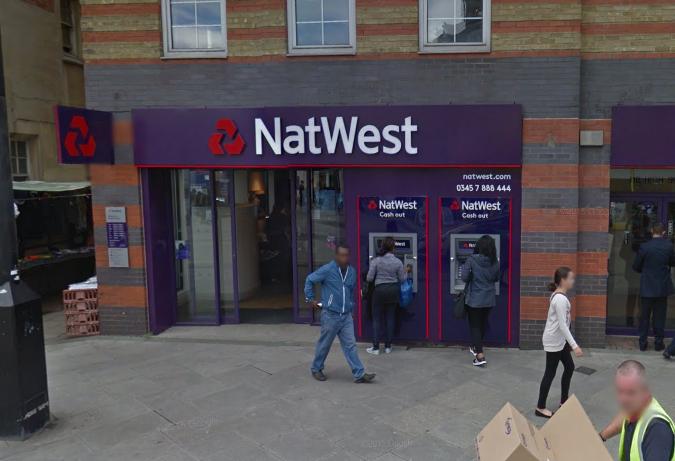From artisanal crepes to rebellious cheesecake waffles, Reading's breakfast rebels are transforming morning meals. These seven spots will revolutionize how you start your day.
The landscape of Slough High Street is set to change as NatWest prepares to erase its physical presence from the area. In a move that signals the end of an era for local banking, the financial institution has secured planning permission to remove all traces of its operations from its soon-to-be-former branch.
Dismantling a Financial Landmark
This development goes beyond a simple closure, as NatWest plans to strip away all external signage and marketing materials that have long been familiar sights to Slough residents. Perhaps most significantly, the branch's cash machine—a vital resource for many in the community—will also be removed, further altering the streetscape and potentially impacting local access to cash services.
A Changing Financial Landscape
The NatWest branch on Slough High Street is set to undergo a significant transformation as the bank prepares to remove all traces of its presence. Recently granted planning permission, NatWest will be dismantling not only its external signage and marketing materials but also the cash machine that has long served the local community.
This move marks a pivotal moment in the evolution of banking services in Slough, reflecting broader trends in the financial sector towards digital and remote banking solutions. The removal of the cash machine, in particular, signals a shift in how residents may access their money in the future.
Impact on Local Access to Cash

Source: https://www.sloughobserver.co.uk/news/24584644.slough-natwest-prepares-remove-cash-machine-closure/
The disappearance of the NatWest ATM from Slough High Street raises questions about the availability of cash services in the area. For many residents, especially those who prefer or rely on cash transactions, this closure could represent a significant inconvenience. The loss of this easily accessible cash point may force some individuals to seek alternative locations for withdrawals, potentially impacting local businesses that depend on cash-carrying customers.
Visual Changes to the High Street
Beyond the functional implications, the removal of NatWest's presence will alter the visual landscape of Slough High Street. The familiar sight of the bank's signage and branding, which has been a constant for many years, will soon be a thing of the past. This change contributes to the ongoing transformation of high streets across the UK, as traditional banking institutions reduce their physical footprints in response to changing consumer behaviors and economic pressures.
The Future of Banking in Slough
As NatWest prepares to erase its physical presence from Slough High Street, questions arise about the future of banking services in the area. While the closure of this branch reflects a broader trend towards online and mobile banking, it also highlights the need for alternative solutions to serve those who rely on in-person banking services.
The removal of NatWest's signage, marketing materials, and cash machine represents more than just a cosmetic change. It symbolises a shift in the way financial services are delivered and accessed in Slough, potentially paving the way for new forms of banking to emerge in the community.
As the high street continues to evolve, residents and local businesses will need to adapt to these changes, finding new ways to manage their financial needs in an increasingly digital world. The transformation of this once-prominent NatWest branch serves as a tangible reminder of the ongoing changes in the banking sector and their impact on local communities.
Community Response and Adaptation
The closure of the NatWest branch on Slough High Street has sparked discussions among local residents and business owners about the changing nature of financial services in their community. Many are concerned about the loss of face-to-face banking options, particularly for older residents or those less comfortable with digital banking.
Local community groups have begun to organise informational sessions to help residents navigate the transition to online and mobile banking platforms. These initiatives aim to ensure that no one is left behind as the financial landscape evolves.
Potential for New Opportunities
While the closure of the NatWest branch represents the end of an era, it also opens up possibilities for new developments on Slough High Street. The vacant space left by the bank could attract new businesses or services to the area, potentially contributing to the revitalisation of the high street.
Some local entrepreneurs view this as an opportunity to introduce innovative financial services tailored to the community's needs. Ideas being discussed include the establishment of a community-focused credit union or a fintech hub that could bring new jobs and services to Slough.
Preserving Financial Inclusion
As traditional banking services become less accessible on the high street, there is growing concern about financial inclusion. Local authorities are exploring partnerships with remaining financial institutions to ensure that essential banking services remain available to all residents.
Proposals include the introduction of mobile banking units that could visit different parts of Slough on a regular schedule, providing a physical banking presence for those who need it. Additionally, discussions are underway about the potential for shared banking hubs, where multiple banks could offer services from a single location, maximising efficiency while maintaining a physical presence in the community.
Looking to the Future
The removal of NatWest's presence from Slough High Street serves as a catalyst for broader discussions about the future of the area. Urban planners and local officials are using this moment to reassess the role of high streets in modern communities and how they can evolve to meet changing needs.
There is a growing recognition that high streets must diversify beyond traditional retail and banking to remain vibrant and relevant. Ideas being explored include the integration of community spaces, cultural venues, and mixed-use developments that could breathe new life into the area.
As Slough adapts to these changes, the transformation of the former NatWest branch symbolises both the challenges and opportunities that lie ahead for the community. It marks not just the end of an era, but the beginning of a new chapter in the story of Slough High Street.